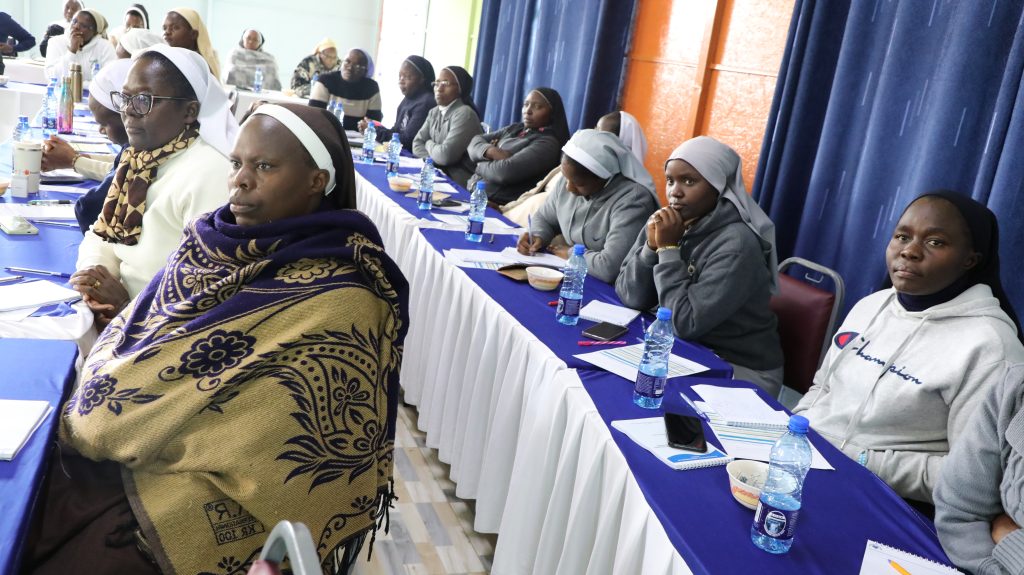AOSK-SAFEGUARDING
About Us - AOSK Safeguarding Office
The AOSK Safeguarding Office was established to provide leadership, coordination, and oversight on safeguarding across all member congregations of the Association of Sisterhoods of Kenya (AOSK). The office is dedicated to creating safe environments within religious institutions, ministries, and communities, where children, vulnerable adults, and all persons at risk are protected from harm, abuse, neglect, and exploitation.
Our work is guided by Catholic values, social teaching, and the universal call to uphold human dignity. At the same time, we are firmly anchored in legal and policy frameworks at the Church, international, regional, and national levels. This ensures that safeguarding within AOSK is both a matter of faith and a legal responsibility.
At the Church level, we are guided by the 1983 Code of Canon Law, particularly canons that outline procedures for investigating misconduct. We also draw direction from Vos Estis Lux Mundi (2019, updated 2023), a papal decree that emphasizes accountability and mandatory reporting in cases of abuse,
and from Sacramentorum Sanctitatis Tutela (2001, revised 2010), which provides procedures for addressing grave crimes, including the sexual abuse of minors.
The Catechism of the Catholic Church also serves as a moral compass in upholding the dignity of every person, particularly children and the vulnerable.
Internationally, our work aligns with the United Nations Convention on the Rights of the Child (CRC, 1989), which emphasizes the protection of children from all forms of violence, neglect, and exploitation. We are also guided by the Optional Protocol on the Sale of Children, Child Prostitution and Child Pornography (2000), the UN Convention on the Rights of Persons with Disabilities (2006), and the Universal Declaration of Human Rights (1948).
At the regional level, the Safeguarding Office draws from the African Charter on the Rights and Welfare of the Child (1990), the African Charter on Human and Peoples’ Rights (1981), and the Maputo Protocol (2003), which safeguards the rights of women and girls in Africa.
Nationally, our work is embedded in the Constitution of Kenya (2010), which upholds human dignity and expressly
protects children from abuse and exploitation under Article 53.
We also rely on key legislation such as the Children Act (2022), the Sexual Offences Act (2006), the Counter-Trafficking in Persons Act (2010), the Employment Act (2007), and the Protection Against Domestic Violence Act (2015). Together, these laws establish strong frameworks for safeguarding children and vulnerable adults within Kenya.
By drawing from these Church, international, regional, and national frameworks, the AOSK Safeguarding Office ensures that all member congregations comply with both faith-based and statutory safeguarding obligations. Our mandate is to prevent harm, respond effectively to cases of abuse, and support survivors with dignity, compassion, and justice. We strive to build a culture of safeguarding that is holistic, accountable, and life-giving, ensuring that every person, especially the most vulnerable, can live in safety and flourish.
The values we live by
The work of the AOSK Safeguarding Office is grounded in the following principles:
Respect for Human Dignity
Every person has an inherent right to safety, dignity, and protection from harm.
Zero Tolerance to Abuse
Any form of abuse, neglect, or exploitation is unacceptable and will be addressed with seriousness.
Accountability and Transparency
Safeguarding processes are open, clear, and accountable to ensure justice and fairness.
Best Interest of the Child and Vulnerable Adult
All actions and decisions are guided by what best protects and promotes the welfare of those at risk.
Prevention First
Emphasis is placed on proactive measures such as awareness, capacity building, and risk reduction to prevent
Confidentiality and Sensitivity
Reporting and Case handling are done with utmost confidentiality, professionalism, and respect to those involved.
Mission
To promote a culture of safety, dignity, and accountability within the Association of Sisterhoods of Kenya (AOSK) by ensuring that all children, vulnerable adults, and persons at risk are protected from harm, abuse, neglect, and exploitation. The office is committed to creating safe environments in religious institutions, ministries, and communities through proactive prevention, effective response, and continuous awareness.
Vision
A society where all individuals, especially children and vulnerable adults, live in safety and dignity, free from abuse and exploitation, supported by faith-based institutions that uphold safeguarding as a core value in all ministries.
The Work of the Safeguarding Office

The AOSK Safeguarding Office engages in a wide range of activities aimed at building a safe environment within congregations and the wider society:
1. Policy Development and Implementation
- Developing, updating, and disseminating safeguarding policies and guidelines for congregations.
- Supporting congregations to integrate safeguarding into their institutional structures.
2. Capacity Building and Training
- Conducting workshops, seminars, and training sessions for religious sisters, clergy, teachers, caregivers, and staff.
- Equipping members with knowledge and skills to identify, prevent, and respond to safeguarding concerns.
3. Awareness Creation
Promoting safeguarding awareness through campaigns, publications, and community engagements.
Educating children, youth, parents, and caregivers on their rights and responsibilities.
4. Reporting and Response Mechanism
- Providing clear channels for reporting safeguarding concerns.
- Ensuring timely and sensitive response to allegations of abuse.
- Referring cases to relevant Church structures, legal authorities, and professional services.
5. Monitoring and Evaluation
- Assessing safeguarding practices within congregations.
- Conducting audits, reviews, and follow-ups to ensure compliance with safeguarding standards.
6. Support and Healing for Survivors
- Linking survivors with psychosocial, legal, and spiritual support.
- Offering accompaniment and care for those affected by abuse.
7. Networking and Partnerships
- Collaborating with government agencies, Church institutions, NGOs, and other stakeholders.
- Sharing best practices and fostering solidarity in safeguarding work.
8. Research and Documentation
- Documenting safeguarding experiences, challenges, and successes.
- Conducting studies to inform evidence-based safeguarding interventions
The Face Behind our Work

Sr. Lydia Malala,
Safeguarding Officer

